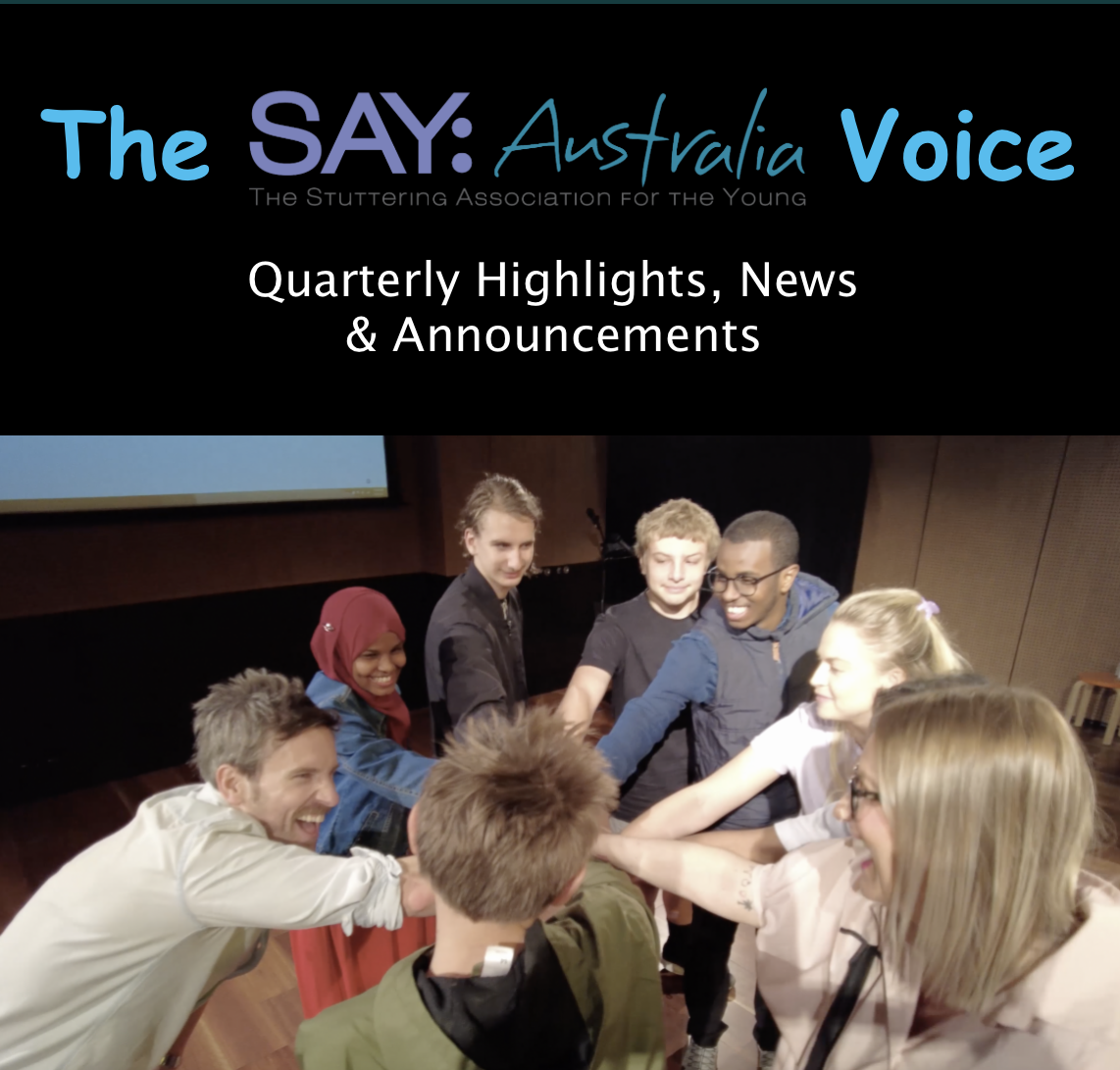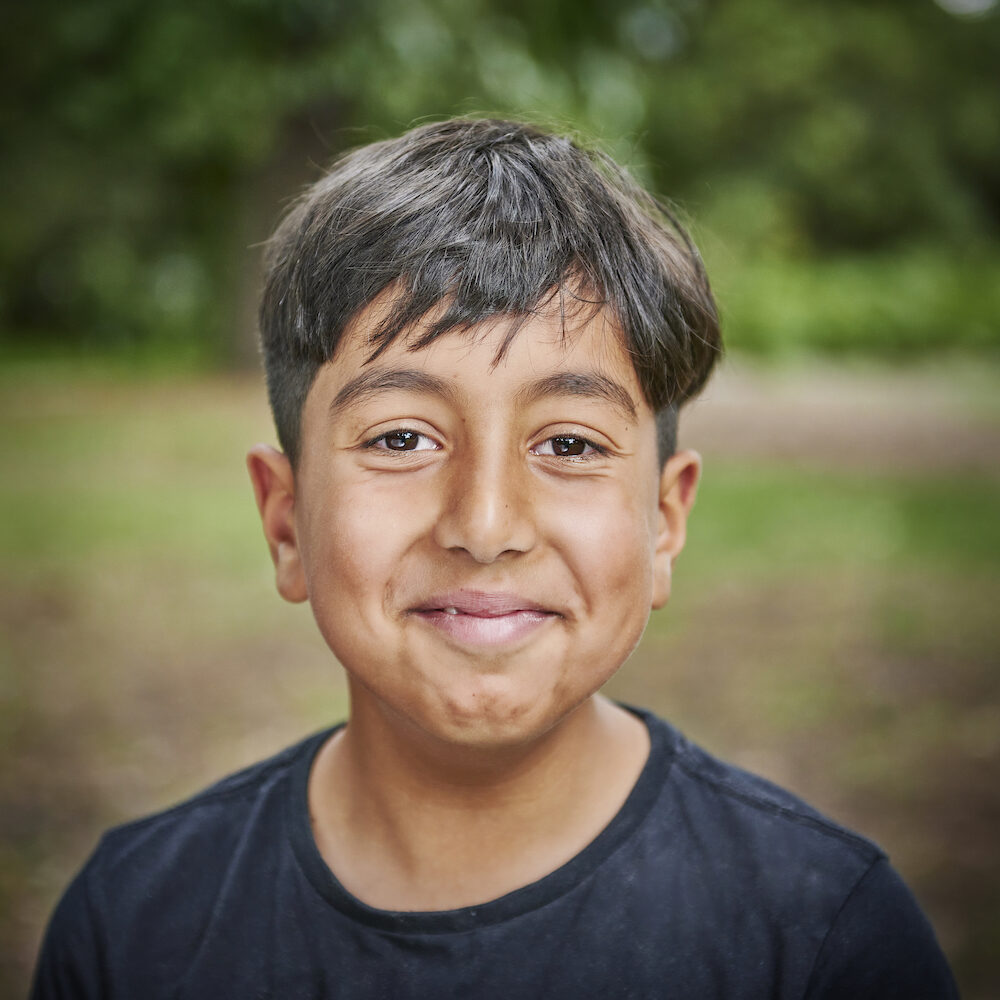SAY: AU provides FREE In-Person and Online Creative Arts Programs for Young People Who Stutter
It sounds so easy, but for the 70 million people who stutter - including 9% of all children - saying what you want to say can become a lifelong challenge.
For many people who stutter the impact of stuttering on their communication attitudes, emotions and quality of life can be far more significant than the speech behaviours.
Given the broad range of ways that stuttering can impact a child and the complex range of surrounding issues, children who stutter often require very personalised and tailored strategies.
We are here to provide you with the information, resources and tools you need to make your interactions with a young person who stutters as productive and empowering as possible, and showing them that their voice truly matters and is truly heard!
Every child deserves to live each day with acceptance, compassion and joy.
FAQ
What is stuttering?
Stuttering looks different in each person and can even change over the course of a person’s lifetime. Stuttering during childhood is common with more than 1 in every 10 Australian preschool child stuttering.
While many of these children will recover from stuttering, approximately a third will persist with stuttering into the school years and adulthood. In fact, by adulthood, 1 in 100 people around the world stutter—that’s 70 million people!
There are 3 common key components to stuttering:
-
Speech behaviours — characteristics of speech that you can see and hear. For example:
- Sound repetitions (“Let’s ride in the c-c-car”)
- Part word repetitions (“I want a ba-ba-banana”)
- Whole word repetitions (“But-but-but I like that one”)
- Phrase repetitions (“I want-I want to go to the park”)
- Sound prolongations (“Hey, that’s mmmmmy toy”)
- Blocks (“Let’s read a —– book”)
- Secondary characteristics – other body movements produced when a person is stuttering. These can include excessive eye blinks, leg shaking, lots of tension in the throat, or many other characteristics.
Each person who stutters will produce different combinations of these speech behaviors and experience different degrees of difficulty speaking. It is also important to recognize that stuttering is much more than what we can see and hear.
-
Impact on communication attitudes and emotions.
- Some people who stutter are not bothered by their stuttering at all. Many others, however, struggle with shame, embarrassment, anxiety, or low self-esteem.
-
Impact on everyday life.
- Many people who stutter go to great lengths to try to hide their stuttering. As a result, they may avoid or struggle with many situations, such as ordering a meal at a restaurant, introducing themself, or reading aloud in class. Children who stutter may also face bullying or teasing at school because of the way that they talk.
What causes stuttering?
The exact cause of stuttering is still unknown. In recent years however, researchers have identified a genetic component to stuttering as well as subtle differences in the structure and function of the parts of the brain used for speech. Extensive research is still required to identify all of the genes involved in stuttering and to better understand how the brain functions in people who stutter.
It is important for everyone to know that stuttering is no one's fault......not the child's, not the parent's, no one is to blame. Stuttering is not caused by anything parents do. And the speech behaviors produced when a person stutters are involuntary, which means that they cannot always be controlled.
How should I act around someone who stutters?
Be yourself and give the person who stutters as much time as they need to speak.
Remember—the only difference between a person who stutters and a person who doesn’t stutter is that the person who stutters may need some extra time to say what they want to say.
Review our Listening Tips below for more thoughts on how to support people who stutter of all ages.
Can stuttering be cured?
There is no known “cure” for stuttering nor are there any known medications to treat stuttering.
However, speech therapy and support groups have been shown to help children and young people who stutter reduce the negative impact that stuttering can have on their lives. Young children (typically aged 2 ½ to 6) may recover naturally from stuttering as they approach the school years, while others will achieve reductions in stuttering through early intervention with a speech pathologist.
By the school years, the likelihood of a child recovering from stuttering (naturally or treatment facilitated) begins to decline. While some young people will still find speech therapy helpful to manage their stuttering as they get older others may find that support groups or other programs play a positive role in helping them to better understand their own speech. The most important thing to remember is that different people will find different strategies helpful for them.
What can I do to help my child who stutters?
You and your child are not alone. Although it may be scary or intimidating to learn about stuttering, it is important to know that there are many professionals who are able to help, and a community of families and people who stutter who are willing to share their stories.
Each young person has different needs when it comes to addressing stuttering. SAY: Australia offers a range of in-person and online programs and social hangs, to support young people who stutter to develop positive attitudes and emotions toward their own speech.
For further information about SAY: Australia’s programs contact Rich Stephens at rich@sayaustralia.org.au or 0401 723 461.
Young People
So You Stutter…
You don’t have to face your stuttering alone! At SAY: Australia, we want to help you say what you want to say, in your own terms and in your own time.
Our programs and social hangs provide you with opportunities where you can make lots of new friends (many who also stutter) and learn some seriously amazing skills. We want you to feel confident about how you speak, and feel free to discuss anything and everything that’s on your mind. Maybe…
-
- You feel like you can’t get your thoughts out, or that people cut you off and don’t let you speak.
-
- You sometimes feel like no one understands you or your stuttering, or you don’t know anyone else who stutters.
-
- You feel anxious or upset about stuttering, or are having problems with kids in school or other people in your life.
-
- You never raise your hand in class, even though you know the answer to the question.
-
- You spend all day trying to hide your stuttering from everyone because you are afraid of what people might say.
-
- You sometimes pretend that you are sick so you don’t have to read aloud in class.
-
- You want to feel better when you speak on the phone, order at a restaurant, think about what career to pursue or have concerns about high school or college.
- You are actually feeling really confident right now with yourself and your stuttering, and you want to keep it going.
"If it’s on your mind, SAY: Australia's programs can help you express yourself – because anything’s possible!"
You can learn more about our exciting creative arts programs here. If you want to join the fun, simply ask your parents to check out the parent section.
Parents
Young people who stutter can face unimaginable fear and cruelty from a world that doesn’t understand them.
Over time, children who stutter may pull back from the world, silencing themselves to hide the stutter, the embarrassment and the shame.
As a parent of a child who stutters, you understand the impact that diminished confidence and self-esteem can have on a child, and how important it is for young people to be better equipped with the tools they need to more effectively navigate the everyday world and overcome obstacles and fears. Children who stutter can also feel isolated and alone if they do not know other young people who stutter.
We are here to give you the support you need to help your child continue to grow and succeed. In addition to our broad range of programs and social hangs created especially for children and teens who stutter – we want you to access the support that you need as well by knowing that you are not alone by connecting with other parents in our community.
Professionals
SAY: Australia is committed to helping educators, speech-language professionals, pediatricians and other professionals to effectively and proactively address the challenges faced by young people who stutter.
It’s a cruel reality that children who stutter face ridicule and bullying.
As a professional Speech-Language Pathologist, educator, pediatrician or other professional, we understand that stuttering can be a very challenging issue and how young people who stutter often benefit from extra time and support.
SAY: Australia offers a broad range of FREE innovative programs that connect groups of children who stutter to help them develop the skills they need to succeed, and which help to address critical social and emotional issues related to stuttering.
Our programs will effectively complement the support that you are currently providing for a young person who stutters.
Our Confident Voices program exposes young people who stutter to various types of performing arts, with no pressure to perform. This exposure to music, writing, acting, dance and more enables children who stutter to fully express themselves and address the pressing issues they face in their everyday life. Read more about our Confident Voices: Australia weekend program.
We conducts presentations for educators, speech-language professionals, and other professionals, providing important information about stuttering and available, much-needed support.
To learn more about how SAY: Australia can support you and/or your organisation, please contact our President Rich Stephens at rich@sayaustralia.org.au or call us on 0401 723 461 today.
Listener Tips
Stuttering is often misunderstood and can make those listening to a person who stutters feel quite uncomfortable.These tips are designed to help make your interactions with a person who stutters a positive, communicative and supportive experience.
- Please be patient. You may be tempted to finish sentences or fill in words, but please refrain from doing so unless you know the other person well and have their permission. Although you may have the best of intentions, completing another person’s sentences may feel demeaning.
- Try to refrain from comments such as “slow down,” “take a breath” or “relax.” To many people who stutter, this advice feels patronising.
- Maintain eye contact and try not to look embarrassed or alarmed. Just wait patiently until the other person is finished talking.
- Be aware that people who stutter usually have more trouble controlling their speech on the telephone. In particular, saying “Hello” can be challenging in this context. Please be extra patient in this situation.
- People sometimes wonder if it’s OK to ask someone questions about their stuttering. This is certainly a judgment call and stuttering should not be considered a taboo subject. However, some people who stutter are sensitive about it and may prefer not to discuss the subject. By following the rules of common courtesy, everything should be fine.
- A person’s stuttering sometimes makes it harder to understand what they are saying. If you do not understand what is being said, don’t be afraid to simply say, “I’m sorry, I didn’t understand what you just said.” No matter how much of a struggle it was for them to say it, this is preferable to pretending you understood or guessing what was said.
- Let the person who stutters know by your body language and actions that you are listening to what is being said, not how it’s being said. Be yourself and be a good listener.
- Always remember, people who stutter are the same as people who don’t stutter – it may just take them a bit longer to speak.
Please be kind, compassionate and a great listener because in the end, what ties us all together is the incredible gesture of human kindness!

Mailing List
By submitting this form, you are consenting to receive marketing emails from: SAY: Australia. You can revoke your consent to receive emails at any time by using the SafeUnsubscribe® link, found at the bottom of every email. Emails are serviced by Constant Contact

A Melbourne-based National not-for-profit and ACNC registered health promotion charity

© 2019 SAY: Australia ABN 84631362359
FOLLOW US







